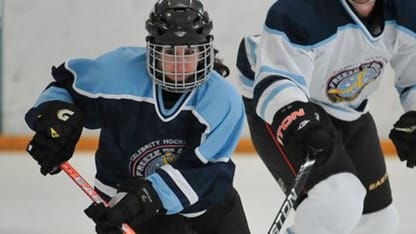The NHL is celebrating Gender Equality Month in March, and throughout the month, NHL.com will be featuring women who are Making Hockey Happen.
Today, Maria Dennis, who was a member of the United States team that finished second at the 1990 IIHF Women's World Championship and is the director of player health and safety and associate counsel for the NHL Players' Association, writes about what Gender Equality Month means to her.
What Gender Equality Month means to me: Maria Dennis
NHLPA executive, former U.S. player on what can be done to change attitudes toward female athletes

By
Maria Dennis / Special to NHL.com
I was about 11 years old when I was told by my (male) coach that I would not make the travel team because I was a girl. I was the only girl in my youth hockey association back then. I figured I had two arms, two legs, two eyes and a brain, so I didn't think it mattered that I was a girl. That was four decades ago. What worries me is that, though times have certainly changed for the better, the attitude that girls somehow are inferior to boys, or that girls should not be playing the same sports as boys, or that girls should somehow be shut out from sports activities and receive less attention in the media just because of their gender, still exists. This attitude must stop.
I think the first step in rewiring this societal mindset is to start with what we can do within our own spheres of influence. The biggest barrier is that we need to make it more "normal" for girls and women to be involved in sports like hockey and provide more opportunities for them to do that. When I was 6 years old, my dad put me on the ice at a time when it was unusual to see a girl play hockey. I was an anomaly. I asked him what made him even think to put me on the ice with all the boys? To this day, my father insists that he didn't think it was a big deal. For my father to think that it was nothing out of the ordinary is just amazing and I will be forever grateful to him for having that attitude. This experience of mine demonstrates that sometimes it takes one person, like my dad, to have an impact. Making a conscious effort to normalize the sight of girls and women in traditionally male-dominated environments is something everyone can do. Representation matters.
As chair of the NHL and NHL Players Association's Female Hockey Advisory Committee, I've been privileged to work alongside a team of brilliant women who, like myself, understand how important it is to create representation and identify female role models for young girls to look up to. If little girls see females accomplishing something, they believe they can achieve the same success for themselves. If you see it, you can believe it. Subsequently, if little boys see females doing something, they don't think it's unusual. It will just be normal to see a female playing hockey, flying a plane, or serving as President. As a result of the Committee's first recommendation to build and identify role models, the NHL and NHLPA implemented the Female Hockey Ambassador Program to encourage NHL clubs to hire female ambassadors to serve as role models, community liaisons and to execute grassroots marketing events with a specific focus on girls and women. This program has already seen huge returns on investment, not just growing the sport of hockey in a number of NHL club markets, but also increasing awareness.
The Female Hockey Ambassador Program is just one of the actions that the NHL and the NHLPA are taking, but what can we do as individuals? I'll give you an example. My mother taught kindergarten for many years. In the 1970s, a decade after the Civil Rights Act of 1964 was passed, my mom had jigsaw puzzles in her classroom that depicted a picture of an African American female doctor and an Asian male astronaut. The kids playing with those puzzles probably didn't think anything of them; it was normal to them because they had seen those images repeatedly. Without even knowing it, the children playing with those jigsaw puzzles were learning that they too could be doctors or astronauts, no matter what they looked like. Because they saw it, they could believe it.
It takes big and small actions to change attitudes. I believe it is incumbent upon all of us to make those efforts. Even one person, one action, one act of speaking up or raising a question or questioning tradition can make a difference. We can all effect change and make the world a better place. I am glad that my parents did.
















